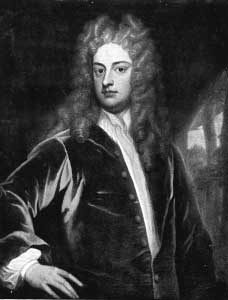Joseph Addison (Joseph Addison)

Playwright, Stateman. He is best remembered for his fictional play “Cato, a Tragedy,” based on the last days of Marcus Porcius Cato Uticensis (or Cato the Younger), the renowned Roman statesman and politician. He was born in Milston, Wiltshire, England, the oldest son of a minister and received his education at Charterhouse School at Godalming, Surrey, England and at the Queen’s College, Oxford, where he excelled in his academics. In 1694 he published his first major work, a book on the lives of English poets, and his translation of Virgil’s “Georgics” was published in the same year. With the financial backing of several influential people who took an interest in his works, he traveled to Europe to look for employment as a diplomat as he continued to write and study politics. When King William III of England died in 1702, he lost his financial stipend and returned home at the end of 1703. He remained unemployed for a year but then was commissioned by Lord Treasurer Sir Sidney Godolphin to write a poem commemorating the Battle of Blenheim fought in Bavaria during the War of the Spanish Succession, resulting in his writing “The Campaign” and he was rewarded with a job as a Commissioner of Appeals under Charles Montagu, 1st Earl of Halifax. He followed up with an account of his travels in Italy, then an opera libretto “Rosamund.” In 1705 he was appointed as Under-Secretary of State and traveled with Charles Montagu on a diplomatic mission to Hanover, in present-day Germany. From 1708 to 1709 he represented the borough of Lostwithiel as a member of the British Parliament and soon after he was appointed secretary to the new Lord Lieutenant of Ireland, Thomas Wharton, as well as the job Keeper of the Records there. Under Wharton’s influence, he became a Member of Parliament in the Irish House of Commons for Cavan Borough from 1709 to 1713. While in Ireland, he met Jonathan Swift and helped to found the Kitkat Club and renewed his association with Richard Steele, whom he had met when he attended the Charterhouse School. He contributed essays to Steele’s publication “Tatler” and shortly they started a new daily publication called “The Spectator” which first appeared on March 1, 1711 and ran until December 6, 1712. He also contributed essays and assisted Steele with publication of “The Guardian” which took the place of “The Spectator” on December 20, 1714. In 1712 he wrote the play “Cato, a Tragedy,” which was a great success throughout England and in the American Colonies, as well as Ireland. His last publication was “The Freeholder,” a government newspaper that ran from 1715 to 1716. In 1716 he married the Dowager Countess of Warwick whose son he had tutored. From 1717 to 1718 he served as Secretary of State for the Southern Department of England. However, due to criticism of “The Freeholder” he soon fell out of favor with Parliament and resigned as Secretary of State due to his failing health but remained a member of the British Parliament as a representative from Malemsbury, Wiltshire, until his death at Holland House in London, England. (bio by: William Bjornstad) Family links: Spouse: Charlotte Middleton Addison (____ – 1731)* *Calculated relationship
Born
- May, 01, 1672
- England
Died
- June, 06, 1719
- England
Cemetery
- Westminster Abbey
- England

